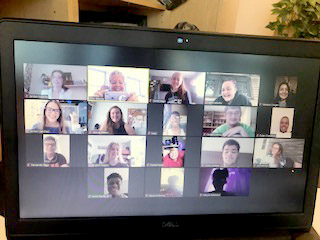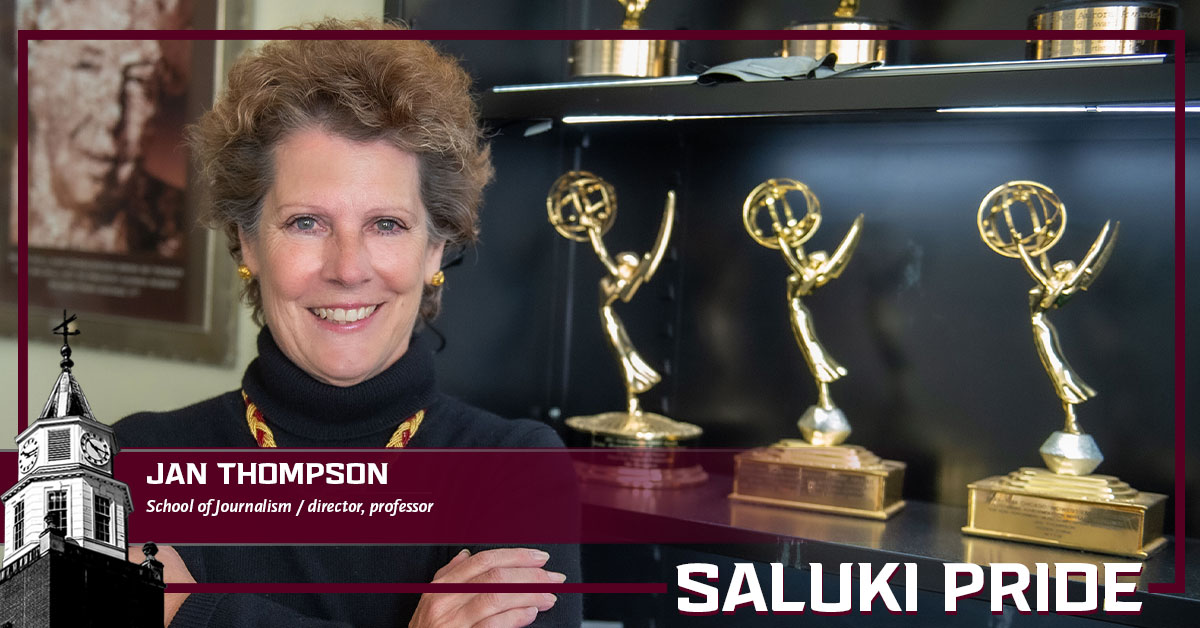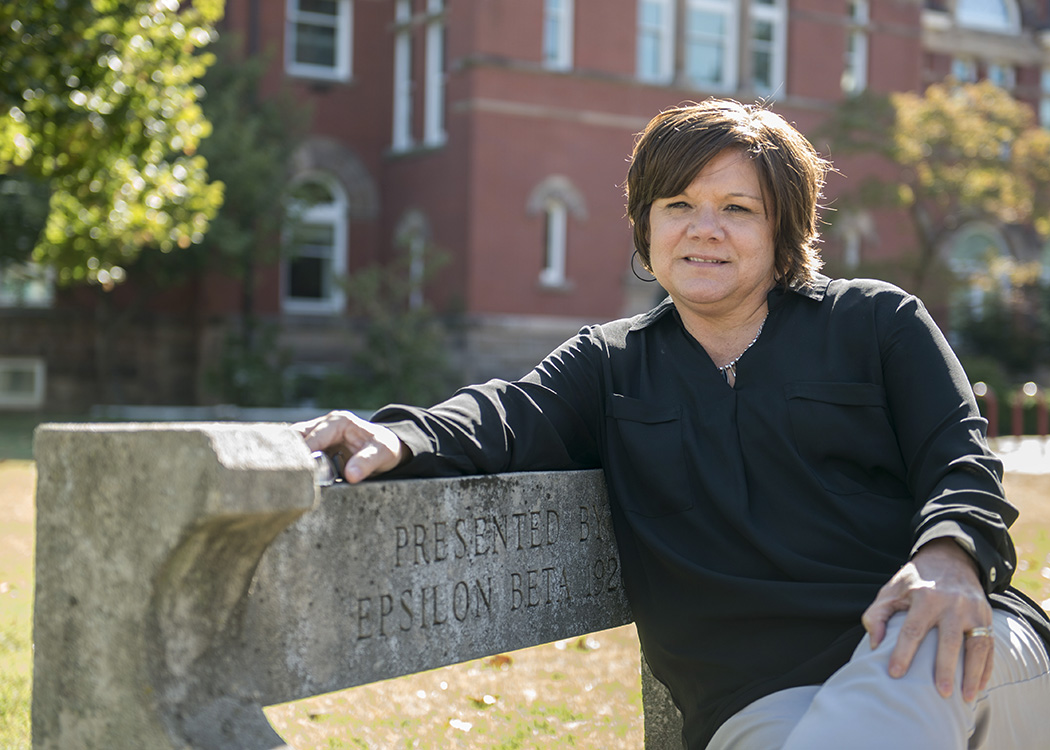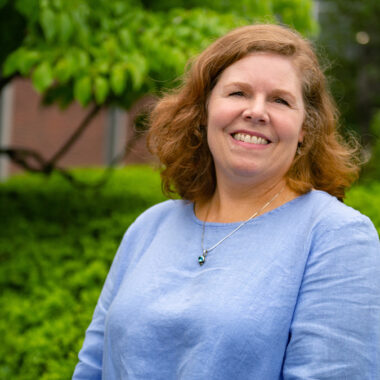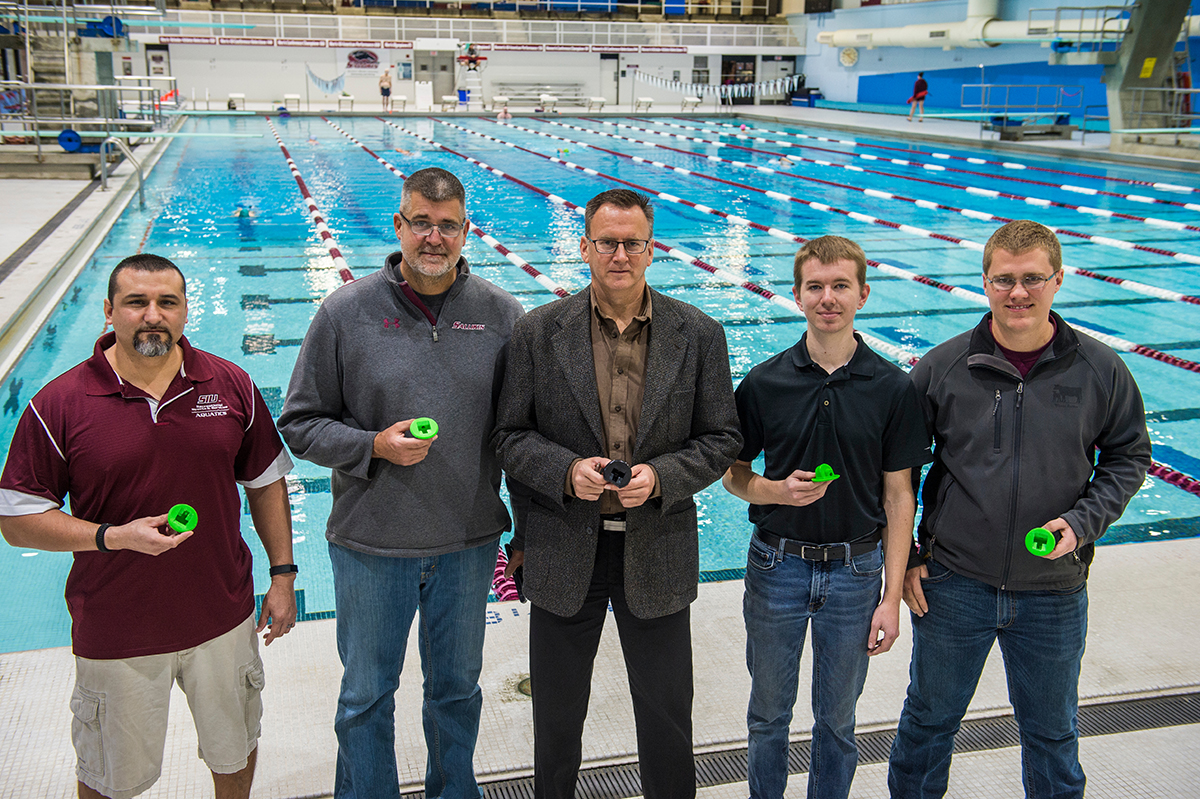Charlie Birger met his demise on a hangman’s gallows in Benton on April 19, 1928. It was Illinois’ last execution by hanging.
But the notorious Southern Illinois gangster has come back to life thanks to a group of Professor Pinckney Benedict’s graduate creative writing students at Southern Illinois University Carbondale.
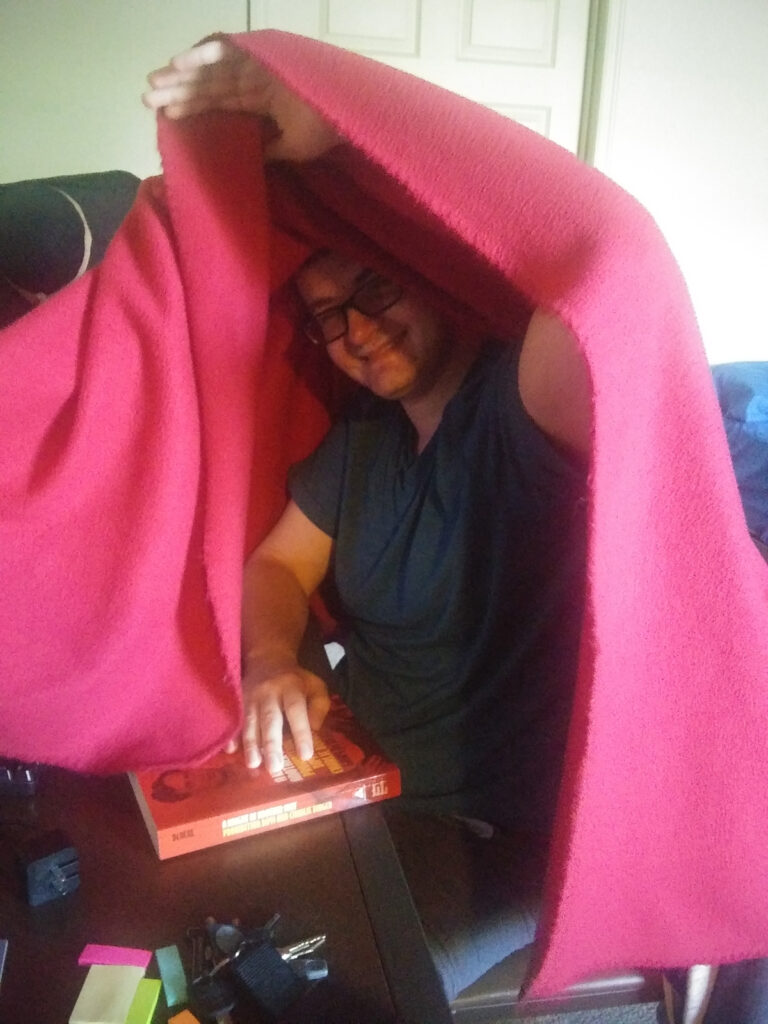
Check out SIU’s new podcast series
Last week marked the launch of a new podcast series, Blanket Fort Radio Theater: A Storytelling Initiative from Southern Illinois University Press, in collaboration with the Creative Writing Program and WSIU. The inaugural 35-episode podcast brings listeners into Birger’s world. Other fascinating tales will follow.
WSIU is hosting the podcasts on the NPR One platform and they are available for free at blanketfortradiotheater.com.
An infamous “knight” kicks off the series
As soon as Jay Livingston saw the cover of Gary DeNeal’s “A Knight of Another Sort: Prohibition Days and Charlie Birger,” he was intrigued.
“I said, ‘We have to do a podcast on the sexy criminal bootlegger who went after the KKK,’” Livingston, of Charleston, told his classmates.
Livingston, who just completed his first year as a Master of Fine Arts poetry student, had never heard of the Prohibition-era mobster.
“I did not know a thing about Charlie Birger, or that he was even a person, prior to this podcast,” agreed Audrey Holmes, another first-year MFA fiction student from Chicago. “What a fascinating individual, though.”
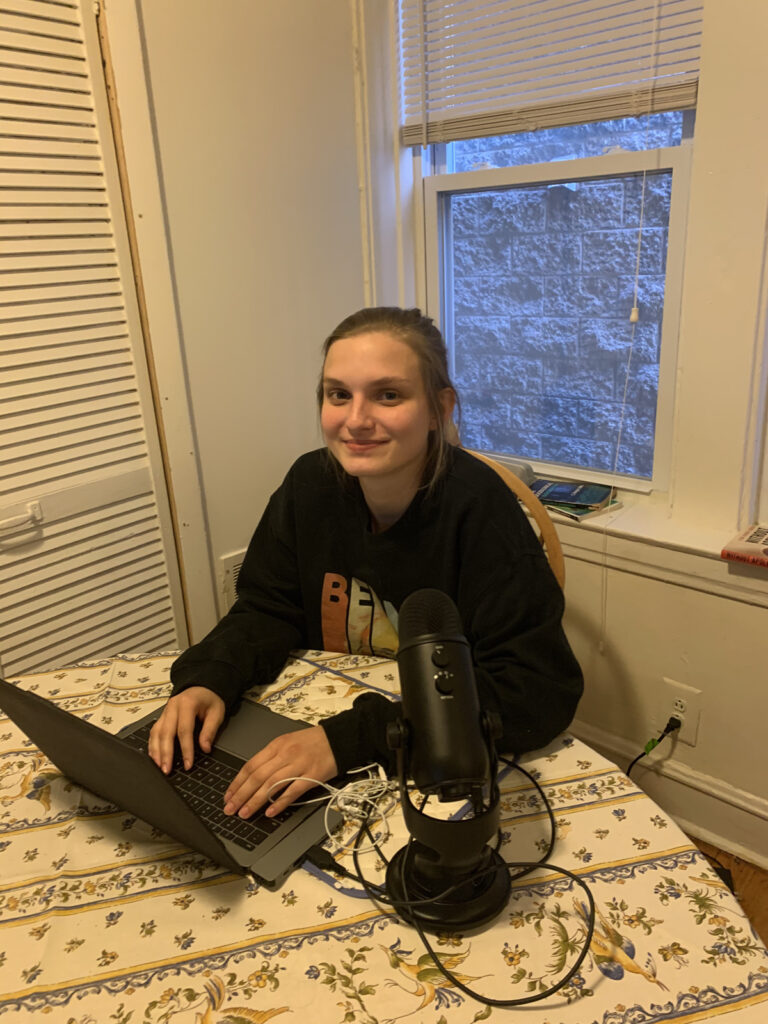
They and four fine arts classmates quickly found themselves entrenched in the life and times of the Russian immigrant who engaged in assorted criminal activities from his Williamson County barbecue stand and Shady Rest cabin.
Birger and his gang evoked terror throughout the region, even battling the KKK, and yet Birger enjoyed playing a Robin Hood role of sorts, giving food, coal and protection to people in Harrisburg and Saline County. Via a cast of dozens of characters portrayed by the six students and the many friends, relatives, classmates, roommates, faculty and staff they recruited, the colorful and frightening true story of Birger is told.
Inauspicious beginnings
The podcast project began when SIU Press sought help creating audio versions of its printed books. Staff connected with Benedict who thought, “Wouldn’t it be cool if we could deliver an SIU signature sound for audio books?”
His students were all in. They divided into four groups, and each selected a favorite SIU Press book and set to work self-producing podcasts reminiscent of the serial dramas so popular in the Golden Age of Radio.
They recorded a few sample episodes and instantly “we really knew we had something,” Benedict said. “The reaction was really gratifying.”
Production moved full speed ahead. The initial recordings took place in the new state-of-the-art podcast booth at Morris Library and the podcasting lab at Faner Hall. The student-produced, serialized audio books are not your standard everyday audio books, though. Rather, think full-scale theater productions for radio.
Based on DeNeal’s book, the student producers wrote scripts, cast characters, recruited speakers, recorded parts, dubbed music, edited and also handled technical details.
And then COVID-19
Just as the project was going into overdrive, many students headed to their homes across the country for spring break. Then the COVID-19 pandemic hit the nation, resulting in SIU switching to online and alternative classes for the remainder of the semester.
There were no more face-to-face group planning meetings. Most of the students had no access to fully-equipped recording booths. The challenge became how to improvise using the available resources: laptops, cellphones, free software, and even kitchen tables and closets.
But even those students who were graduating in May remained fully committed and determined to keep the project alive. Creativity, ingenuity, adaptability, determination and persistence became the name of the game.
Finding a way
The students were able to find a variety of free software programs they could access to help them create and edit their audio. David Ballard, a second-year creative writing/fiction MFA student from Jacksonville, encountered a tricky problem as narrator. He and his classmates were determined to make their production as accurate as possible. For Ballard that meant countless hours of online research seeking audios with the distinctive Southern Illinois pronunciations of the locations cited and proper pronunciations of the various surnames in the book. Thankfully, he found many online news stories to help, and eventually even located a YouTube video about British parliament members who stood up to King Charles II some 400 years ago.
“Thank you for your courage, Denzil Holles. Without you I never would have known how to say that name for the like two times in the course of the entire book it appears,” Ballard laughs.
He and his classmates also had to come up with a system for organization and communication “on the fly” since they couldn’t see each other. While “there were growing pains, I’d say we got pretty good.”
A name is born
It’s often said that necessity is the mother of invention, and that certainly proved true regarding recording for the project. One student initially tried recording at her kitchen table but, unhappy with the sound quality, she pulled a couple of chairs together, threw a blanket over them and crawled inside her blanket fort to remake her recording.
The experiment worked, and soon the other students were creating their own versions of the sound pod. It seemed only natural to select Blanket Fort Radio Theater as the moniker for the podcasts.
Ballard did a lot of experimenting with his blanket fort and admits “I did kind of rue the day she discovered blanket forts at times, as it could get very hot under that thing. After a long recording session I would come out of my room drenched with sweat, as if I was the one getting into gunfights with Klan members, not Charlie Birger.”
Ballad spent a good bit of time trying to get the setup just right for optimal sound quality and striving to be able to read the script in the dark environment. He eventually downloaded a copy of the book to his computer and read from the screen while recording. Ballard’s roommate helped record a number of small parts and while he missed the impressive professional equipment on campus, he did enjoy being able to take care of required corrections or retakes quickly at home.
“I could just move my mic to the center of my desk, huddle under a blanket and get it done right then,” he said.
While some had blanket forts, Lizabeth Engelmeier, a second-year MFA fiction student from Flora, said she “had a feather-pillow-and-folding-chair fort.” It served her well as she voiced the part of Beatrice Bainbridge, Charlie’s second wife, and other roles. In addition to enlisting her dad to play the part of deputy Joe Schafer on his cellphone, Engelmeier also edited nine episodes, selected some music and handled various other production elements, all while switching to teaching online graduate classes, making all new lesson plans and completing her own classwork.
“We set a very fast, demanding pace for ourselves,” Engelmeier said. “There was never downtime in the production schedule.”
Not an easy process
She encountered other obstacles, too. Proclaiming her home to already be “world’s noisiest apartment building” located along a main road and alley with plenty of dogs, toddlers and other sounds, she found the distractions intensified as neighbors responded to the stay-in-place directives with hours of vacuuming, keyboard jam sessions and other noise.
“Sometimes recording a single paragraph for the podcast took me an hour because I had to restart around all the noise. The beauty of AKOAS is in how much is going on in it and how many tones it juggles, so a little roughness around the edges was fine,” Engelmeier decided. “It’s about making an interesting thing, not a perfect thing. That’s a lesson I’m going to carry into my other podcasts and into my writing.”
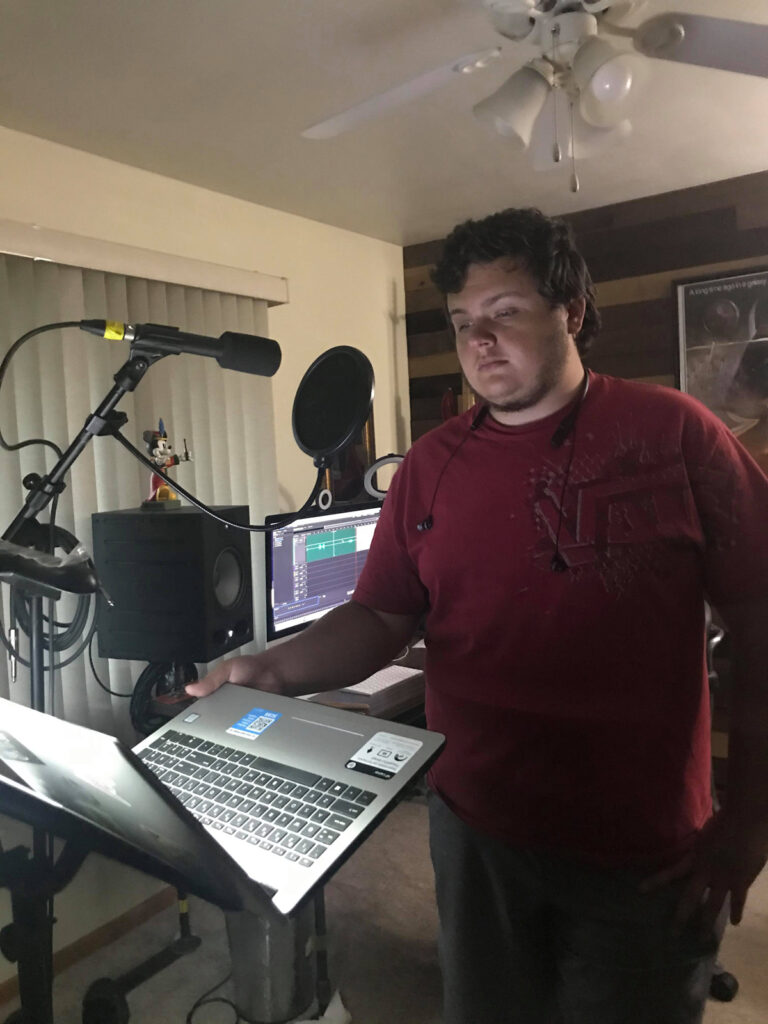
A family affair
Making the podcast was a family affair for Mandi Jourdan, a third-year creative writing/fiction MFA candidate from Vandalia. She recruited her brother Riley Herron, an SIU music student, to play the title role of Charlie Birger.
Her father, SIU music alumnus Cliff Jourdan, played several roles including Lory Price, a state patrolman killed by the Birger gang. Mandi’s boyfriend, cinema and photography alumnus Justin Gordan, also voiced numerous characters including gang member Connie Ritter and Sheriff Lige Turner. Mandi also voiced several characters, including the blonde bombshell, and served as the editor for eight episodes.
“I loved getting to try out different voices and hearing everyone else’s takes on their characters,” Jourdan said. “It was challenging but fun to figure out how to incorporate difference voices and formats.”
She was amazed at how everyone worked together creating an audiobook featuring so many parts with a relatively small cast of people. Working on the project taught her “a lot about collaboration and how to delegate jobs within a large project.”
She bought her own microphone and a pop filter to help with her home recordings and also battled to record around lawnmowers, barking dogs and other neighborhood noises. She discovered “it’s okay if we can’t get everything shot perfectly within the first few takes.”
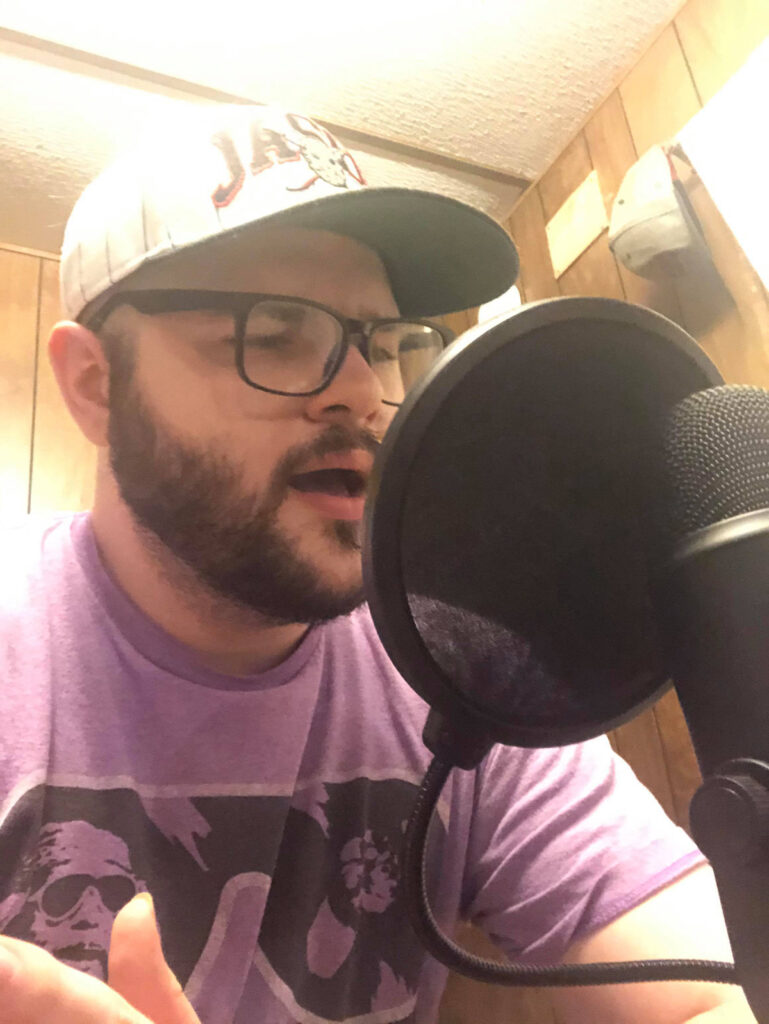
“It was a challenge getting the voices we needed within the timeframe we needed it every week, added Sarah Jilek, a double alumna of SIU from DeKalb who earned her bachelor’s in English in 2016 and completed her MFA in fiction in May. “It taught us there’s no excuse not to create.”
She recruited fiancé Chris Clark to play gang member Carl Shelton and several other roles. Her dad, John Jilek, played a minor role, too.
“The multitude of minor characters gave us all the opportunity to have our friends and relatives play roles, which felt very special,” Jilek said.
Livingston edited 11 episodes and voiced numerous small parts, some as small as a few words, while also working part-time at a local restaurant. He said he recruited many friends and relatives for roles – “anyone with a decent mic, a newer phone or who might like to hear their voice on the radio.” The voices chimed in from as far away as Chicago and the Quad Cities. For Livingston, the most difficult task was learning to do the sound editing, but he was fortunate to have a cinema and photography major roommate with good equipment and expertise to help.
Seeing the students’ determination and how skillfully they were able to create a polished final product was “one of the best times I’ve ever had as a teacher,” Benedict said.
“This shows the resilience of these bright students and their commitment to this project,” Amy J. Etcheson, interim co-director of SIU Press, said. “I’m utterly delighted and surprised by what they could do.”
Learning experience with many possibilities
The making of the podcasts has been a monumental learning experience on many levels, the students say.
“I never knew how much bootlegger activity there was in this area back during Prohibition, and I certainly never would have guessed the gangs were arming up with tanks and airplanes to use against each other,” Ballard said. “It was a wild ride!”
Jilek was fascinated to discover another side of the region. While vocalizing a couple of parts and editing and producing nine episodes, she also enjoyed “learning the history of places I had visited in person or lived in.”
“For example, I read about a shootout on Route 13 between Carbondale and Marion, which was the route I had taken to work every day for a year. Surreal moments like that happened frequently while working on this project.”
Holmes said finding out about Birger and working with Benedict and the other talented students were the best parts of the project. She played the role of Beulah Adams, the wife of Joe Adams, who was shot to death in front of her eyes by the Birger gang on Charlie’s orders.
Learning to use the recording and editing software from scratch was the most difficult part of the project but also quite rewarding for Holmes, whose career plans are to teach, including at the college level, and to publish novels.
“This project was amazing. I learned invaluable sound-editing skills and also got to see how writing stories with audio is done,” Holmes said. “Stories nowadays seem to tend more and more towards and audio medium, whether it be through a podcast or a movie or something else sonic, so learning how to make a good story using only audio is absolutely going to help me professionally.”
“This project was the most stressful thing I’ve done but in a good way,” said Livingston, whose goal is seeing books of his poetry published. “It was also the biggest creative group endeavor I’ve ever been involved in; there was a lot of respect and accountability. It was a good experience.”
Engelmeier agreed, noting that despite all of the difficulties, the students persevered and created a finished project they are all very proud of.
“This podcast taught me to just go for it,” she said. “A global pandemic and a state lockdown couldn’t stop us from producing an audiobook. What can stop us at this point from doing anything?”
Jourdan already has five novels and two short story collections published and works as a proofreader for a publishing company and its imprints. Working on this project has increased her confidence and her ability to work remotely and enhanced her abilities, especially related to podcasting, she said.
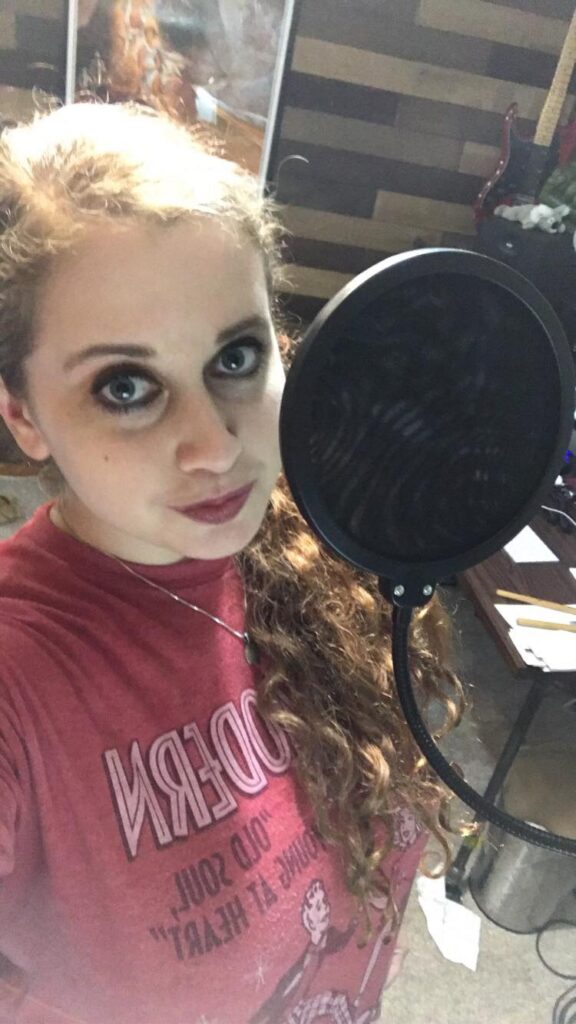
“I know I’ll be able to keep recording and editing my own podcast, “Shadows of the Mind,” which is an adaptation of my novel series, even if I don’t have access to the school’s podcasting labs,” she said. She also said Benedict’s teaching has been phenomenal in many ways, including his challenge to his students to set up TikTok accounts because “he thought that learning to be interesting to strangers in 15-second intervals would help us become more interesting in our fiction.”
She said the goal was to make a video good enough to get 100 likes. Her Harry Potter-related videos garnered up to thousands of views and likes. Jourdan kept her @absaluki TikTok account and has worked to build her audience. Now boasting nearly 2,000 followers and 50,000 likes, she hopes to get these fans interested in her fiction as well.
“I learned that there is no excuse to not try to create the project you’re putting off because of an apparent lack of funding, resources or anything,” Jilek said. “The recording spaces in the library and the podcasting lab in Faner were great resources while we had them, but the shift to our home recording studios didn’t stop us. It simply made us more creative and resourceful, and more technically skilled in the process.”
Her goals include novel writing, teaching and podcasting. Her first crime/dark comedy novel is due out in October from SFK Press, and she’s confident her work on Blanket Fort Radio Theater: A Storytelling Initiative is paving the way toward the future success.
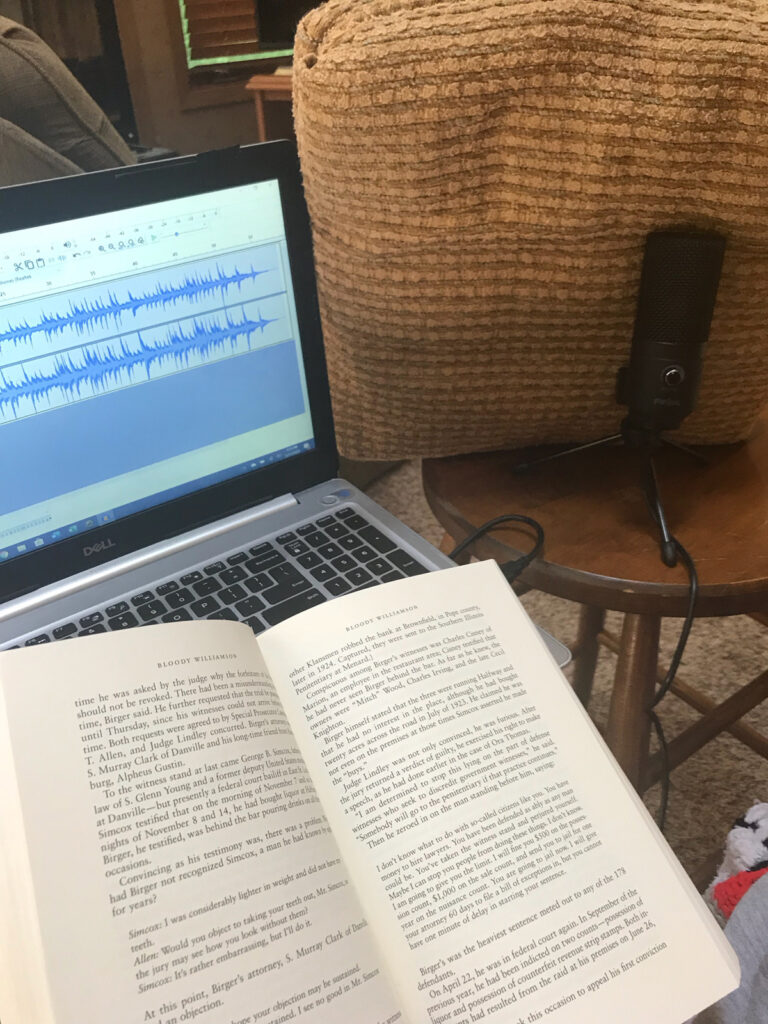
Distinctive offering
Benedict said the project model and the productions are “unprecedented in the country” in that a university press, public radio and academic programs are working together to create a high-quality broadcast that could quite easily serve as a model for other institutions.
Podcast previews have drawn rave reviews already.
“I’m just thrilled with this. I think it’s terrific, a fascinating project with a lot of possibilities,” Jak Tichenor, interim executive director of WSIU, said. “One of the many benefits of this project is that it gives the students practical experience producing a professional-quality audio book and podcast.”
The students say they indeed appreciate what an extraordinary opportunity they’ve undertaken with this project.
“Personally, I’m honored to be involved in bringing this story to light in a new way,” Jilek said. “We’ve been working so hard on it lately that I haven’t really stepped back to consider the scope of the whole story: that it began when the author was just a child listening to his grandfather tell stories about Charlie Birger. It’s kind of amazing that we’re still telling those stories a century after the events happened, and finding new and exciting ways to tell them. Professionally, I think it speaks to the goals of SIU’s digitally-oriented fiction program. We’re doing things here that other universities aren’t, and I think we’re making a name for ourselves. I also think that those of us who worked on the podcast have developed the discipline and technical knowledge to be able to adapt and produce any audio projects we set our minds to.”
Just the beginning
A new episode of “A Knight of Another Sort” will be released each week. Later this year, the second podcast will debut; episodes of the two podcasts will overlap.
Several other podcasts are in the works, each produced by SIU students from SIU Press books. The productions, along with brief descriptions of each, include:
- “Survived By One: The Life and Mind of a Family Mass Murderer” by Robert E. Hanlon with Thomas V. Odle. This is the true crime story of Thomas Odle, who at the age of 18 in November 1985 killed his parents and three younger siblings in their Mt. Vernon home. All were stabbed repeatedly in the neck except for the youngest brother, who was strangled. Odle, who claimed to be the victim of a lifetime of maternal abuse, was subsequently sentenced to die, although the sentence was later commuted to natural life in prison.
- “Mother Jones, the Miners’ Angel” by Dale Fetherling. This family friendly biography chronicles the life of Mother Jones and her half-century labor organizer fight on behalf of coal miners and other workers.
- “The Undaunted Women of Nanking: The Wartime Diaries of Minnie Vautrin and Tsen Shui-fang”, edited and translated by Hua-ling Hu and Zhang Lian-hong, supplemented with information from “American Goddess at the Rape of Nanking: The Courage of Minnie Vautrin” by Hua-ling Hu. This poignant account, comprised of personal and historic details, recounts the murder and/or rape of thousands, even hundreds of thousands of Chinese women by occupying Japanese soldiers in 1937.
Future potential
Benedict said the podcasts are quite special for many reasons.
“They are a unique way to attract listeners and attract new authors to SIU Press,” he said. “These are also truly interdisciplinary works,” Benedict said, offering tremendous opportunities for students from television, theater, marketing and a wide range of other fields to work together on future projects.
Extra insights
The Blanket Fort Radio Theater Show offers a behind-the-scenes look at the making of the Blanket Fort Radio Theater podcasts. Hosted by Etcheson and Benedict, it is broadcast on WSIU Radio, 91.9 FM, each Thursday at 8:43 a.m. and 5:44 p.m.
Plans are underway for interviews with some of the book authors in the future as well.

